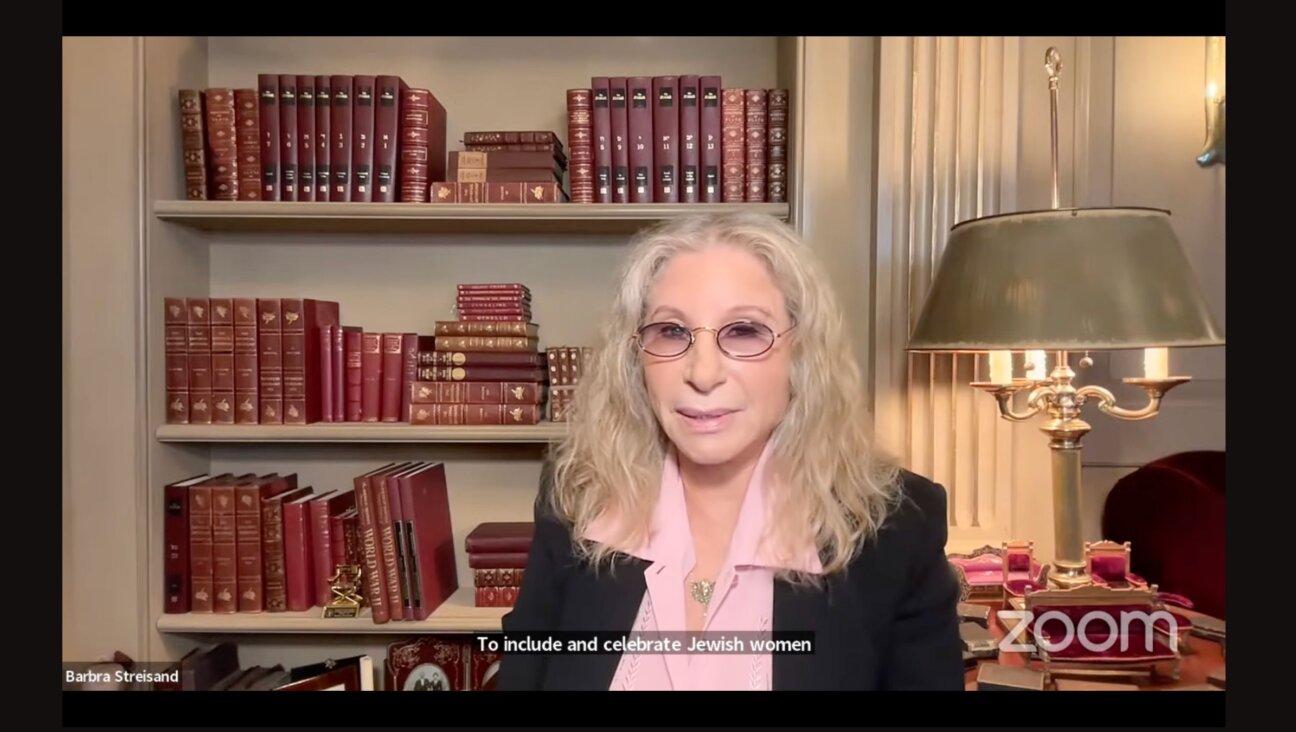My Children Married Non-Jews — and It Breaks My Heart

Image by Lily Padula
The Seesaw is a new kind of advice column in which a a broad range of columnists will address the real life issues faced by interfaith couples and families. Join the discussion by commenting on this post, sharing it on Facebook or following the Forward on Twitter. And keep the questions coming. You can email your quandaries, which will remain anonymous, to: [email protected]
My Children Married Out
My wife and I are observant Jews who are heartbroken about the fact that both of our children married non-Jews. My daughter married out first, and is now raising non-Jewish children and grandchildren and even celebrates Christmas. Our relationship has been very estranged over the years and we don’t allow her partner in our home. As for my son, well he is more observant than my daughter, but still a few years ago I found out he was living with a non-Jewish woman for nine years. She is not a stable woman, emotionally or physically, and now she is pregnant and will not convert. I do not visit my children in their homes, but am pleasant when they visit us. Though as I am getting older I see no change in the situation and this is starting to have a very depressing effect on me. My wife says I need to move on and welcome their partners in our home, but I doubt that this would help them understand where I am coming from. So where to from here?
It’s Not Too Late

JANE LARKIN: Last week was the twentieth anniversary of the death of the charismatic Lubavitcher leader Rabbi Menachem Mendel Schneerson. Rabbi Schneerson inspired followers to reach out with unconditional love to all people–including non-Jews. He grasped the importance of acceptance of all individuals and how engagement can influence people’s choices.
You’ve missed these lessons. By rejecting your children’s partners, you’ve lost the opportunity to influence your kids’ families through exposure to Jewish life, and by choosing strict adherence to a religious norm over unconditional love, you have given up the chance to have meaningful relationships with your children and grandchildren.
Your wife is right. It’s time to welcome your children’s partners into your life.
Thirty-four years ago when my uncle married his non-Jewish girlfriend, my grandmother gave my grandfather similar advice. As hard as it was, my grandfather took it. He enjoyed a relationship with my uncle and his family for years before developing dementia, even though my uncle’s home had no religion and celebrated a secular Christmas. When my brother and I intermarried, my mother followed her father’s example and welcomed our spouses into the family.
Having two intermarried children may seem like terrible luck, but the Talmud teaches us that it’s difficult to know what is truly good or bad, regardless of appearances, when a story is still unfolding. Before my grandfather’s health declined, he heard my college-aged cousin announce that he was considering a Birthright trip to explore his Jewishness. My mother sees me creating a home with a greater level of Jewish engagement than my childhood household. While, my brother’s family practices no religion, they celebrate Jewish holidays at my mother’s. Who knows how this will affect his children’s connection to Judaism.
It’s not too late to follow Rabbi Schneerson’s practice of showing loving kindness to others. Welcome your children’s partners into your home, and use your relationship to influence — not control — the direction your family’s story will take.
Jane Larkin writes about parenting for InterfaithFamily.com, a website that supports interfaith families exploring Jewish life. She is the author of the forthcoming book, “From Generation to Generation: A Story of Intermarriage and Jewish Continuity.” She lives with her family in Dallas, TX.
You’ve Made Your Point, Now Move On

SUSAN KATZ MILLER: In short, please listen to your wife. You have made your point, and there is nothing further to gain from continuing to reject your extended interfaith family. Children, even those raised with the most thorough religious educations, grow up and make their own choices about religious practice. Your daughter and son have chosen partners. You can be a part of their lives, or not. You can develop relationships with your grandchildren, or not. You can model for them what it is for you to be a Jew, and share, if your children agree to it, the joys and traditions and values of your own religion. Your grandchildren have Jewish heritage, and you have an opportunity to help them to connect with this heritage — to feel affection for Judaism, to deepen their understanding of the religion and the civilization, whether or not they ultimately choose to practice Judaism.
The fact that your children still visit you, although you reject their partners, says a tremendous amount about their love for you, their strength of character, their ability to forgive. It is time to meet them halfway. Picture yourself with your children and grandchildren, no matter their religious labels, around a Passover seder table. Envision your grandchildren hunting for the afikomen. This can still happen, if you open your heart now.
Susan Katz Miller is both an adult interfaith child, and an interfaith parent. She is a former Newsweek reporter, and the author of “Being Both: Embracing Two Religions in One Interfaith Family” (Beacon Press).
What Purpose is Your Disapproval Serving?

RUTH NEZMOFF: You do not need to continue beating your children over the head with your condemnation. Since you never go to your children’s homes, I suspect they have some idea of “where you are coming from.” Besides they were brought up as observant Jews and likely were encouraged to marry another Jew. They know they did not follow that mandate. Your disapproval is serving little purpose since it obviously not bringing your children back to Judaism.
Why not try being more welcoming and see if your children are then more open to at least incorporating some Jewish history or holidays into their lives? When you stop trying to “convert” your grandchildren, you may find your children let you talk about your values, your memories and what is meaningful to you about being Jewish. Many Jewish grandparents and communities are discovering that being hospitable is far more effective than shunning in terms of creating positive links to Judaism.
Holding onto your disappointment may help you feel self-righteous and a protector of the Jewish people, but using your energy to create bonds that facilitate education and inclusion might actually accomplish your purposes better. Keeping “shalom bayit” (peace in the home) IS a Jewish value. You can be like so many of our biblical forbearers who embraced a non-Jewish spouse.
In Deuteronomy 29, verses 9-14, Moses states: “I make this covenant, with its sanctions, not with you alone, but both with those who are standing here with us this day before the Lord our God and with those who are not with us here this day.” As explained by G-dcast, this means that “there is room for them (those not just a part of the Jewish people) to be part of the covenant, if they choose.”
While you may not change the behavior and beliefs of your children’s partners, you may find you can make them and your grandchildren friends of our people.
Besides, as you note, you are getting older. Is a legacy of animosity the one you want to leave to your children?
Dr. Ruth Nemzoff, author of “Don’t Bite Your Tongue: How to Foster Rewarding Relationships with Your Adult Children” and “Don’t Roll Your Eyes: Making In-Laws into Family” is a resident scholar at The Brandeis Women’s Studies Research Center. She is on the Board of Interfaithfamily.com.























